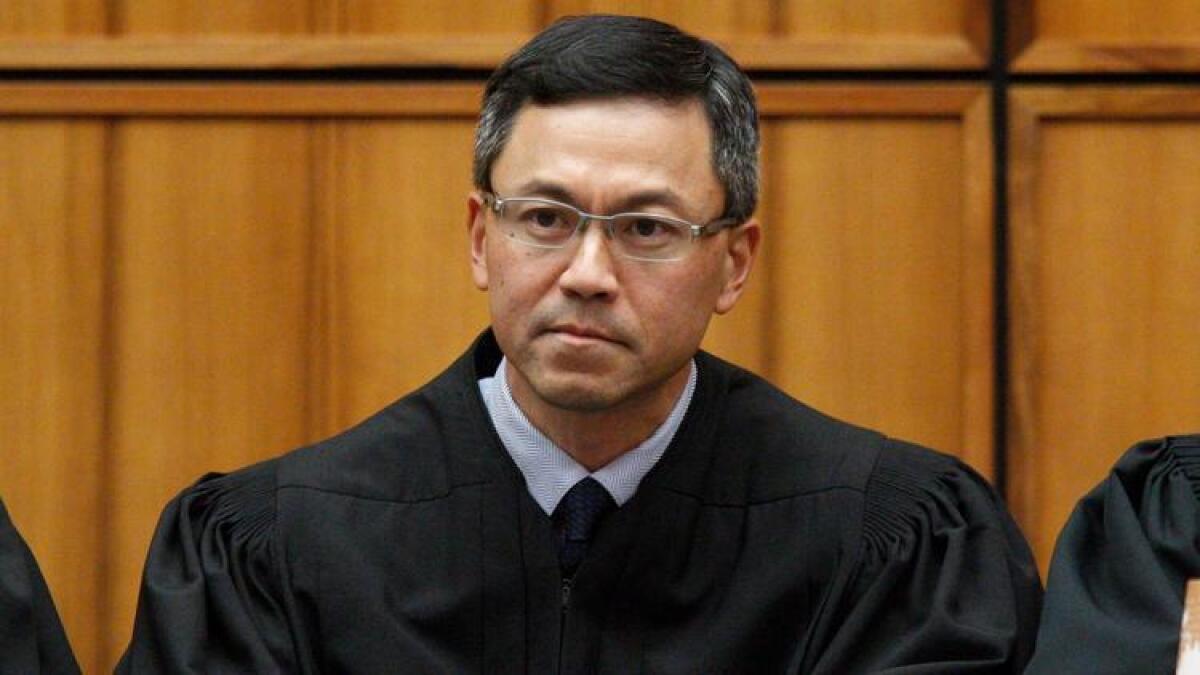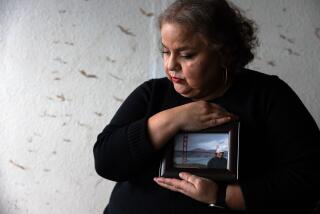Trump administration says it will go to Supreme Court after Hawaii judge expands travel ban exemptions

The Trump administration said Friday it would go to the Supreme Court to fight a Hawaii federal judge’s decision vastly expanding the number of people exempt from the government’s ban on travelers from six predominantly Muslim countries and all refugees.
U.S. District Court Judge Derrick Watson ruled Thursday that the government had failed to follow Supreme Court orders last month that established conditions for a partial revival of the ban, whose implementation had been blocked by the courts.
The decision does not halt the travel ban, which was reinstated by the Supreme Court on June 29 with exemptions for a limited list people with “bona fide” U.S. connections, such as close family members. But going against Trump administration policy, the ruling expands the exceptions to include travelers who have grandparents, grandchildren, aunts, uncles, nieces, nephews, cousins and brothers- and sisters-in-law in the U.S.
The judge also said that contrary to government policy, refugees cannot be blocked if they have “formal assurance” from U.S. resettlement agencies for relocation to the country — even if the refugees do not have relatives in the U.S.
The administration’s implementation of the ban’s limits represented “the antithesis of common sense,” the judge said.
In a statement Friday, Atty. Gen. Jeff Sessions accused Watson of trying to “micromanage” the president’s authority over ensuring national security.
“By this decision, the district court has improperly substituted its policy preferences for the national security judgments of the executive branch in a time of grave threats, defying both the lawful prerogatives of the executive branch and the directive of the Supreme Court,” Sessions said.
In the meantime, unless a higher court intervenes, Watson’s decision means that potentially thousands of refugees who had been vetted for U.S. admission but were blocked after the government cut off most refugee admissions on Wednesday — the day the country hit a cap of 50,000 refugee admissions for the fiscal year — may now be let in.
“We are reviewing the decision and will be in consultation with DOJ to ensure immediate implementation,” the Department of State said in a statement Friday.
The Department of Justice also said in a court filing Friday that it was challenging Watson’s order in the U.S. 9th Circuit Court of Appeals.
Refugee resettlement groups and immigrant advocates on Friday celebrated Watson’s decision.
The order “represents relief for over 24,000 refugees who had already been vetted and approved by the U.S. and assigned to resettlement agencies. Many of them had already sold all of their belongings to start their new lives in safety,” Becca Heller, director of the International Refugee Assistance Project, said in a statement. The group is among those suing the administration over the ban.
“This decision gives back hope to so many who would otherwise be stranded indefinitely,” Heller said. “Nevertheless, we will continue to fight for our refugee clients, who are still affected by the government’s attempts to freeze refugee resettlement.”
For two weeks, the Trump administration and the state of Hawaii have fought repeatedly in federal courts over whom the ban can block.
At issue is how to determine which travelers have “close” relatives living in the U.S. or are associated with the country in other ways that let them bypass the ban — standards set by the Supreme Court when it lifted the previous halt on enforcement of the ban.
President Trump’s executive order halts travel by nationals of Somalia, Syria, Sudan, Yemen, Libya and Iran but allows exceptions for those with what the Supreme Court called “bona fide” connections with the U.S. The government has said those connections include a parent, spouse, child, adult son or daughter, son-in-law, daughter-in-law, sibling, fiance or fiancee, and in-law parents.
But the administration said grandparents, grandchildren, aunts, uncles, nieces, nephews, cousins and brothers- and sisters-in-law are not close enough to qualify for admission during the duration of the order. Attorneys for the state of Hawaii successfully petitioned Watson to order the government to count all of those categories as “bona fide” U.S. connections.
In the case of refugees, state lawyers argued that a refugee resettlement organization’s interactions with a refugee constitute a bona fide relationship. The administration disagreed.
Hawaii’s win came after it was twice rejected in court attempts to weaken the ban.
On July 6, Watson denied a request from the state to “clarify” exceptions to the ban, saying that he did not have the authority to interpret Supreme Court orders. The next day, the U.S. 9th Circuit Court of Appeals rejected a similar request from the state, saying it did not have jurisdiction over the matter.
But appellate judges told challengers that they could try a different legal maneuver in the district court. Judges said Hawaii attorneys could request Watson to issue an injunction against the ban’s implementation or modify an injunction he had issued that previously had halted the ban before his order was partially lifted by the Supreme Court. Hawaii filed both requests last week.
The travel ban calls for a three-month pause on travel to the U.S. by nationals of the six Muslim-majority countries and a four-month halt on all refugee resettlement.
Watson was one of the judges who granted a restraining order blocking implementation. His order was issued in a case filed in March by the state of Hawaii.
Successful challenges in that case and another filed in a Maryland federal court were upheld in the 9th Circuit and 4th Circuit appellate courts before requests were made to the Supreme Court to rule on the constitutionality of the ban.
On June 26, the Supreme Court said the ban could be put back into place with exceptions, but left it up to the government to define most of them. The court indicated its move was a temporary measure until justices hear full arguments on Trump’s executive order in the fall.
Jaweed Kaleem is The Times’ national race and justice correspondent. Follow him on Twitter, Facebook and Instagram.
ALSO
Appeals court rejects Hawaii’s request to let grandparents and other relatives bypass travel ban
Who is in and who is out under the revived travel ban
UPDATES:
12:36 p.m. July 14: This article was updated with the Trump administration’s decision to appeal the ruling and reaction from refugee groups.
This article was originally published at 10:30 p.m. July 13.
More to Read
Start your day right
Sign up for Essential California for news, features and recommendations from the L.A. Times and beyond in your inbox six days a week.
You may occasionally receive promotional content from the Los Angeles Times.







